 Making the Basic Settings
Making the Basic Settings Making Advanced settings
Making Advanced settings Setting the print time
Setting the print time Previewing your printout
Previewing your printout Saving spool data as a file
Saving spool data as a filePrinter Software Functions / For Users of Mac OS 8.6 to 9.x
Making the Basic Settings
Making Advanced settings
Setting the print time
Previewing your printout
Saving spool data as a file
You can make Media Type, Mode, Ink, Copies, and Pages settings in the Print dialog box. From this dialog box, you can also access other dialog boxes, from which you can set the print time, preview the document before printing, and save spool data as a file. Refer to the appropriate section below.
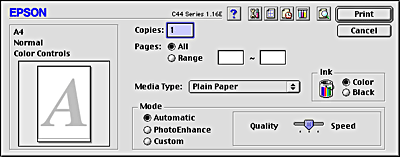
To make the Copies setting, enter the number of copies that you want to print in the Copies text box.
To make the Pages setting, choose All or Range. If you select Range, enter the appropriate range of pages in the Range text boxes.
The Media Type setting determines what other settings are available in the Print dialog box, so you should always make this setting first.
Select the Media Type setting that matches the paper that is loaded in the printer. To find out what media type you are using, find your media in the Media Type Settings list.
 | Media Type Settings |
The Ink setting allows you to print in color or black and white. Click Color to print in color, or Black to print in black and white or grayscale.
The Mode settings give you three levels of control over the printer software, as explained below.
|
Automatic |
This mode provides the quickest and easiest way to start printing. See Using the Automatic mode for details. |
|
PhotoEnhance |
This mode lets you choose from a variety of image-correction settings specially designed for photos. See Using the PhotoEnhance mode for details. |
|
Custom |
This mode lets you choose from a list of ready-made or personalized settings suited to the kind of document that you want to print. When Custom is selected, the Advanced button is available, allowing you to access the Advanced dialog box. See Using the Custom mode for details. |
In addition to making comprehensive Mode settings that affect overall print quality, you can also modify individual aspects of your printout using the settings contained in the Page Setup and Layout dialog boxes. See Making Settings in the Page Setup Dialog Box or Making Settings in the Layout Dialog Box for details.
When Automatic is selected, the printer software takes care of all detailed settings based on the current Media Type and Ink settings.
| Note: |
|
The PhotoEnhance mode provides a variety of image correction settings that you can apply to your photos before printing. PhotoEnhance does not affect your original data.
| Note: |
|
|
You can choose from the following settings.
|
Standard |
Provides standard image correction for most photos. Try this first. |
|
People |
Best for photos of people. |
|
Nature |
Best for outdoor scenery, such as mountains, skies, and oceans. |
|
Soft Focus |
Makes your photos look as if they were taken with a soft-focus lens. |
|
Sepia |
Applies a sepia tone to your photos. |
Selecting PhotoEnhance also makes the Digital Camera Correction check box available. Select this check box when you are printing photos taken with a digital camera, to give your printed images the smooth, natural appearance of photographs taken with a film camera.
Selecting Custom as the Mode setting makes the Custom Settings list available, from which you can choose a ready-made setting designed for printing text and graphs. Or you can select ColorSync, a color-matching method. You can also create and save your own custom settings. For details on making your own custom settings see Making Advanced settings.
You can select from the following ready-made settings.
|
Color-matching method |
Description |
|
Economy |
Best for printing drafts of text. |
|
ColorSync |
Automatically adjusts printout colors to match the colors on your screen. |
When you select a custom setting, other settings, such as Print Quality, and Color Management, are made automatically. Changes to these settings are reflected in the display at the left side of the Print dialog box.
Follow the steps below to select a custom setting.
 | Confirm that the Media Type and Ink settings in the Print dialog box are correct. |
 | Select Custom. This makes the Custom Settings list available to the right of the Custom radio button. |
 | From the Custom Settings list, select the most appropriate setting for the type of document or image that you want to print. |
The settings in the Advanced dialog box give you complete control over your printing environment. Use these settings to experiment with new printing ideas or to fine-tune a range of print settings to meet your individual needs. Once you are satisfied with your new settings, you can give them a name and add them to the Custom Settings list in the Print dialog box.
To open the Advanced dialog box, select Custom and then click Advanced.
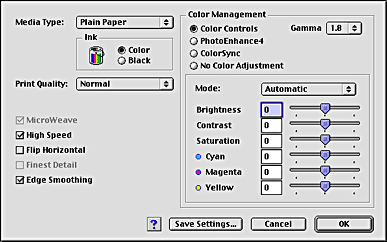
| Note: |
|
|
The Media Type setting determines what other settings are available, so you should always make this setting first.
Select the Media Type setting that matches the paper that is loaded in the printer. To find out what media type you are using, find your media in the Media Type Settings list.
 | Media Type Settings |
The Ink setting allows you to print in color or black and white. Click Color to print in color, or Black to print in black and white or grayscale.
Select the desired Print Quality from the list.
| Note: |
|
The Microweave feature reduces the possibility of banding and prints in finer increments. This allows you to generate superior output, but it also increases the amount of time required to print.
This setting activates bidirectional printing so your printer prints both left-to-right and right-to-left. High Speed mode speeds up printing, but decreases print quality.
Prints an image as it would appear in a mirror. Text and graphics appear reversed.
Prints text, solid graphics and line art with very sharp edges.
| Note: |
|
|
Improves the print quality of low-resolution images by smoothing jagged edges and lines. This setting has no effect on high-resolution images or on text.
For use with the color matching and image enhancement methods provided by the printer driver. When you select Color Controls, additional settings appear under Color Management, allowing you to select a Mode setting and to adjust the Color Enhancement sliders.
To control image contrast by modifying the midtones and mid-level grays.
| Note: |
|
This mode provides a variety of image correction settings that you can apply to your photos before printing. PhotoEnhance does not affect your original data.
| Note: |
|
|
You can select from the following settings.
|
Normal |
Applies EPSON standard tone adjustment to your document. |
|
Hard |
Prints in high contrast, which sharpens the printed image. |
|
Vivid |
Intensifies the colors and lightens the midtones and highlights of an image. Use this setting for presentation graphics, such as charts and graphs. |
|
Sepia |
Applies a sepia tone to your photos. |
|
Monochrome |
Prints the image in black and white only. |
You can select from the following settings.
|
Sharpness |
Sharpens the overall image, particularly the outlines. |
|
Soft Focus |
Makes your photos look as if they were taken with a soft-focus lens. |
|
Canvas |
Makes the image look like a picture painted on canvas. |
|
Parchment |
Makes the image look as if it was printed on parchment. |
Selecting PhotoEnhance4 also make the Digital Camera Correction check box available. Select this check box when you are printing photos taken with a digital camera to give your printed images the smooth, natural appearance of photographs taken with a film camera.
This mode automatically adjusts the printout colors to match the colors on your monitor.
Matches the printout colors to the colors displayed on your monitor according to the information stored in the selected profile. EPSON Standard is a custom-designed profile that works with your printer.
You can select from the following settings.
|
Perceptual |
The most commonly used option for reproducing photographs. |
|
Saturation |
The best option for reproducing vivid images. Use this setting for presentation graphics, such as charts and graphics. |
|
Colorimetric |
The best option when exact matching of colors is most important. This mode automatically adjusts the printout colors to match the colors on your monitor. Use this setting for printouts like a company logo. |
This setting prints without any color adjustment.
To save your Advanced settings in the Custom Settings list, click Save Settings in the Advanced dialog box. The Custom Settings dialog box appears.
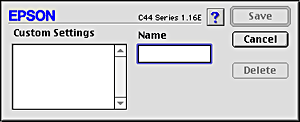
Type a unique name (up to 16 characters) for your settings in the Name text box, and then click Save. Your Advanced settings will be added to the Custom Settings list. You can save up to 100 different custom settings.
To delete a setting from the Custom Settings list, select it in the Custom Settings dialog box and click Delete.
To use your saved settings, select Custom as the Mode setting in the Print dialog box, and then select your setting in the Custom Settings list.
If you change the Media Type or Ink settings while one of your customized settings is selected in the Custom Settings list, the selection shown in the list returns to Custom Settings. The customized setting that was previously selected is not affected by the change. To return to your customized setting, simply reselect it in the list.
You can specify the time when you want the printer to begin printing your document. Follow the steps below.
 |
Click the  Background Printing icon button in the Print dialog box. The Background Printing dialog box opens. Background Printing icon button in the Print dialog box. The Background Printing dialog box opens.
|
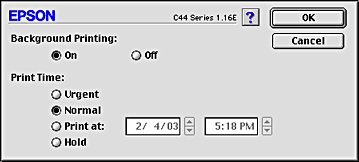
 | Select On as the Background Printing setting, if necessary. |
 | Select Urgent, Normal, Print at, or Hold as the Print Time setting. |
If you select Print at, use the arrows beside the date and time boxes to specify the date and time when you want the document to be printed.
| Note: |
|
 | Click OK. The Background Printing dialog box closes. |
 | In the Print dialog box, make sure that your print settings are as you want them, and then click Print. |
| Note: |
|
The Preview feature allows you to see how your document will look before actually printing it. Follow these steps to preview your document.
 | Make your printer driver settings. |
 |
Click the  Preview icon button in the Print dialog box. The Print button changes into a Preview button. Preview icon button in the Print dialog box. The Print button changes into a Preview button.
|
| Note: |
|
 | Click the Preview button. The Preview dialog box opens and displays a preview of your document. |
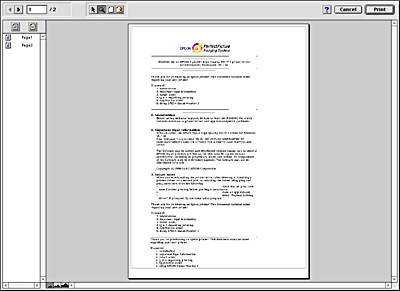
The Preview dialog box contains several icon buttons that you can use to perform the following functions.
|
Icon |
Button name |
Function |
 |
Edit Watermark |
Click to select, move, and resize watermarks. |
 |
Zoom |
Click to enlarge or reduce the size of the previewed page. |
 |
Show/Hide Printable Area |
Click to display or hide the borderlines which indicate the printable area. The printer cannot print anything that is outside of this area. |
 |
Show/Hide Watermark Settings |
Click to open the Watermark Edit dialog box, where you can add watermarks to the document and change any of the current watermark settings. |
 |
Add page |
Click to add or remove selected pages from the list of pages to be printed. |
 |
Remove page |
 | If you are satisfied with the previewed image, click Print. |
If you are not satisfied with the appearance of the image, click Cancel. The Preview and Print dialog boxes close with the current print settings preserved. Open the Print dialog box again to make additional changes to the print settings.
You can save spool data as a file using the  Save File icon button in the Print dialog box. This feature lets you use the saved spool data to print the document at a later time simply by double-clicking the saved file. Follow the steps below.
Save File icon button in the Print dialog box. This feature lets you use the saved spool data to print the document at a later time simply by double-clicking the saved file. Follow the steps below.
| Note: |
|
 | Make your printer driver settings. |
 |
Click the  Preview icon button in the Print dialog box repeatedly until the Print button changes into the SaveFile button. Preview icon button in the Print dialog box repeatedly until the Print button changes into the SaveFile button.
|
 | Click the SaveFile button. The following dialog box appears. |
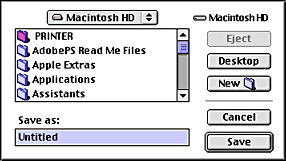
 | Select the location where you want to save the file, and then type a file name in the Save As text box and click Save. |
 |
When you want to print the document, double-click the file to open EPSON MonitorIV, make sure that the correct document is selected, then click the  Resume button to send the data to the printer. Resume button to send the data to the printer.
|
 Previous |
 Next |